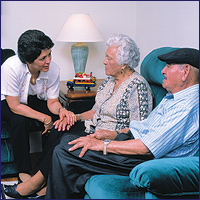Al’s story:
 |
|
Some medications may cause memory problems. Check with your doctor. Changing medications may help. |
Al didn’t know what was happening. He was having a hard time remembering things. He wasn’t eating well and couldn’t seem to get interested in seeing friends or taking his usual walk around the neighborhood. He was confused and irritable. He wasn’t sleeping well at night. His wife was worried. She took him to the doctor. It turned out that Al was having a bad reaction to one of his medicines. Once his doctor changed the medicine, Al felt more like his old self.
What causes serious memory problems?
 |
|
Feeling very sad and worried may cause serious memory problems. |
Medical conditions
Certain medical conditions can cause serious memory problems. These problems should go away once you get treatment. Here’s a list of things that cause memory problems:
- Bad reaction to certain medicines
- Depression
- Not having enough fluids in your body, also called dehydration
- Not eating enough healthy foods, or too few vitamins and minerals in your body
- Minor head injuries
- Thyroid problems
These medical conditions are serious and should be treated by a doctor.
Feeling very sad and worried may cause serious memory problems.
Emotional problems
Some emotional problems in older people can cause serious memory problems. Feeling sad, lonely, worried, or bored can cause you to be confused and forgetful. Being active, spending more time with family and friends, and learning new skills can help. You may need to see a doctor or counselor for treatment. Once you get help, your memory problems should get better.
Anna’s story:
 |
|
Talking to your family about Alzheimer’s disease can help. |
Anna’s mother was still going strong at 85. She kept busy with friends and church activities. But lately, Anna had noticed that things were changing. Her mother was becoming more forgetful and confused. Also, she was spending a lot of time alone in her house, which wasn’t like her. One day, her mom got lost on her way home from shopping. Anna knew it was time to get help. She took her mom to the doctor. Anna was really upset to learn that her mom had early stage Alzheimer’s disease. It’s been tough, but learning about treatment choices and how to live with the disease has helped the whole family. They’re taking one day at a time.
Alzheimer’s disease (pronounced Allz-high-merz di-zeez)
Alzheimer’s disease also causes serious memory problems. The signs of Alzheimer’s disease begin slowly and get worse over time. This is because nerve cell changes in the brain cause large numbers of brain cells to die. It may look like simple forgetfulness at first, but over time, people with Alzheimer’s disease have trouble thinking clearly. They find it hard to do everyday things like shopping, driving, cooking, and having a conversation. As the illness gets worse, people with Alzheimer’s disease may need someone to take care of all their needs (feeding, bathing, etc.) at home or in a nursing home.
|
|
Medication can help
If you are in the early or middle stages of Alzheimer’s disease, taking medications can help. Some medicines keep symptoms, such as memory loss, from getting worse for a time. Medications also can help if you are worried, depressed, or are having problems sleeping. |
|
Some medications can help with memory problems. |
|
Sam’s story:
 |
|
Even active people can have memory problems. |
Sam feels good for a guy his age. He’s an active 70 year old. So, he couldn’t believe it when, all of a sudden, he couldn’t remember what somebody told him 5 minutes ago.
He went for a check-up. The doctor told him that his forgetfulness was caused by small strokes. These strokes had damaged some of his brains cells. She said his problem was called multi-infarct dementia. She said that she couldn’t cure his memory problems, but that she would give him medicine to lower his high blood pressure. This medicine also would lower his chances of having more strokes.
Sam wasn’t happy to find out that his doctor couldn’t fix everything. Even so, he agreed to take his medication. At least then he’d be doing something to keep from having more strokes.
Multi-infarct dementia (pronounced Mull-tee in-farkt di-men-sha)
 |
|
Get your blood pressure checked each time you see the doctor. |
Many people have never heard of multi-infarct dementia. Like Alzheimer’s disease, it is a medical condition that causes serious memory problems. Unlike Alzheimer’s disease, signs of multi-infarct dementia may appear suddenly. This is because the memory loss and confusion are caused by small strokes or changes in the blood supply to the brain. If the strokes stop, you can get better or stay the same for a long time. If you have more strokes, you can get worse. Taking care of your high blood pressure can lower your chances of getting this illness.